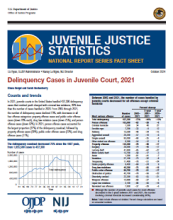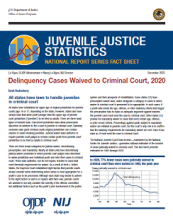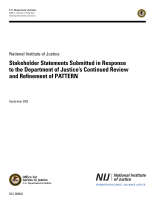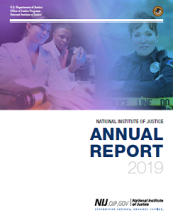Criminal Law
Principles of Forensic Audio Analysis
Using Civil Remedies for Criminal Behavior: Rationale, Case Studies, and Constitutional Issues
Community Responses to Drug Abuse: A Program Evaluation
Sexual Assault Legislation - An Implementation Study
Sexual Assault Legislation - An Implementation Study Executive Summary
Genetic Privacy and the Case of the Golden State Killer—Diving into the Science
DNA 101
This training was presented as a part of the National Center on Forensics conference at George Mason University on August 8th, 2023. In this session, FBI Forensic DNA Examiner Amanda Bakker introduces all the most vital concepts of DNA analysis and evidence. For those who aren’t DNA analysts but work in tangential fields such as law enforcement and criminal justice, this session will be incredibly useful for understanding topics such as what DNA is, how it transfers, how it is collected, and how it is analyzed.
See the YouTube Terms of Service and Google Privacy Policy
Advancing Situational and Developmental Approaches To Prevent Sexual Violence
Delinquency Cases in Juvenile Court, 2021
From the Director: Body Armor Standards Updated to Better Protect Those in the Line of Fire
The Consequences and Impacts of Hate Crime and Post-Victimization Experiences: The Longitudinal Hate Crime Victimization Survey (LHCVS)
DNA 101
Discouraging the Demand That Fosters Sex Trafficking: Collaboration through Augmented Intelligence
Delinquency Cases in Juvenile Court, 2020
Delinquency Cases Waived to Criminal Court, 2020
FIU - Forensic Technology Center of Excellence
Operationalizing the Individual versus Group Fairness Dichotomy for Recidivism Risk Assessment: US Legal Challenges and Technical Proposals
Secretariat for ISO/IEC JTC 1/SC 37, Biometrics
Stakeholder Statements Submitted in Response to the Department of Justice's Continued Review and Refinement of PATTERN
Just Science Podcast: Just Investigative Support for Indigenous Communities
National Institute of Justice Fiscal Year 2019 Annual Report
FIU - Forensic Technology Center of Excellence
Secretariat for ISO/IEC JTC 1/SC 37, Biometrics
Tribal Crime, Justice, and Safety, Part 1
Research indicates that Native American persons experience crime victimization at higher rates than non-Native people. Furthermore, the unique position of American Indian and Alaska Native tribes as both sovereign nations and domestic dependents of the U.S. creates jurisdictional complexities in responding to crime, justice, and safety. Senior social and behavioral scientist Christine (Tina) Crossland discusses NIJ’s research on these topics, especially on the prevention of violence towards American Indians and Alaska Natives. Communications Assistant Stacy Lee Reynolds hosts.









